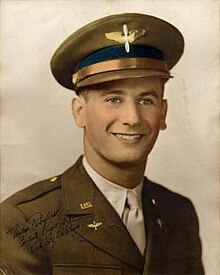Milton Rubenfeld
| Milton Rubenfeld | |
|---|---|

Rubenfeld as a member of the USAAF in 1942
|
|
| Nickname(s) | "Ruby", Milt, "Cy" |
| Born |
September 13, 1919 Peekskill, New York |
| Died | February 21, 2004 (aged 84) Sarasota, Florida |
| Allegiance | United States |
| Service/branch |
Royal Air Force U.S. Army Air Force Israeli Air Force |
| Years of service | 1942–1948 |
| Rank | Flight Officer |
| Awards | World War II Victory Medal |
| Spouse(s) | Judy (Rosen) Rubenfeld |
| Relations |
Paul Reubens, son Abby Rubenfeld, daughter Luke Rubenfeld, son |
Milton "Milt" Rubenfeld (September 13, 1919 – February 21, 2004) was a pilot who flew for the Royal Air Force and U.S. Army during World War II, later becoming one of the five founding pilots of the Israeli Air Force in Israel's War of Independence. It is widely believed that Rubenfeld, the other four volunteer pilots, and the other machalniks changed the course of the War of Independence. He was injured and returned to the United States, and settled in New York state, where he married and owned a local business with his wife, Judy. Later, he moved his family to Sarasota, Florida, where he and his wife owned another successful business until he retired. He died in 2004. He was the father of actor/comedian Paul Reubens, who is known for co-creating and portraying his character, Pee-wee Herman.
Rubenfeld was born in Peekskill, the fourth of six children of Jewish parents, Gussie (Yormark) and Louis Rubenfeld. Rubenfeld was an Eagle Scout, a student in New York University and the University of New Mexico (where he also hunted rattlesnakes), and taught aerobatics.
When World War II broke out in Europe, he wanted to fly combat missions; however, the United States was not yet in the war. Rubenfeld decided to fly with the Royal Air Force in England, with the 420 Squadron. When the United States declared war on Germany, Rubenfeld signed on as a pilot with the U.S. Army.
On the ground the military situation was critical, and in the air the Egyptian air force was king of the skies.... It could do literally anything it wanted. Its Dakotas and Spitfires bombed Tel Aviv and only encountered sporadic anti-aircraft fire. Of course there was no time to consider trifles, such as the fact that [the Avia S-199's] had never taken off, or even been tested in flight, their parts had not been checked, no one knew whether their systems functioned or if their machine-guns fired. No one was sure that their bombs would drop—or that their wings wouldn't. These questions had to be shoved aside.... We swung out to sea ... and swooped towards the Egyptian column. The sight took my breath away.... [Not much] stood between it and Tel Aviv.... I must confess I had a profound sense of fulfilling a great mission.
In February 1948, the Haganah set up an agency in the United States headed by Hyman Shechtman (later, Shamir) assisted by Al Schwimmer, to recruit U.S. combat air veterans, both aircrew and ground crew, for the Haganah's "Air Service". Knowing of Rubenfeld's combat experience, Shamir approached Rubenfeld in early 1948 and asked him if he wanted to fly for the new state of Israel, and Rubenfeld — "a small, swarthy former USAF pilot, so cocky he seemed to swagger even while sitting down"—agreed.
...
Wikipedia
